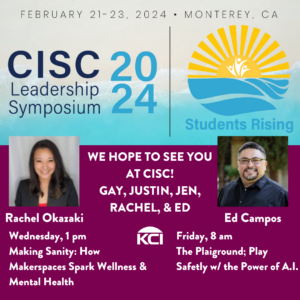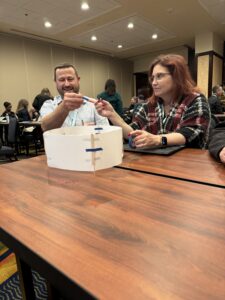February 29, 2024

Monterey, California
The 2024 CISC Symposium in Monterey, California, hosted by Santa Clara County Office of Education (SCCOE) with the theme “Students Rising,” united educators and innovators to explore innovative topics aimed at uplifting every student. The event featured workshops, keynotes, and discussions focused on enhancing educational strategies and innovations. The Krause Center for Innovation’s Team (Gay Krause, Justin Sewell, Jen Gibson, Rachel Okazaki, & Ed Campos) were excited to join this dynamic gathering, aiming to empower educators to inspire a passion for learning in their students and navigate the future of education confidently. Let’s explore the symposium’s key themes and insights, crafted to facilitate transformative changes in classrooms and schools.
Navigating AI in Education
Artificial Intelligence (AI) in education emerged as a pivotal topic, reflecting its growing influence and potential to transform teaching and learning. The symposium provided a platform for exploring how AI can be leveraged to personalize learning, enhance student engagement, and address educational disparities. Educators were invited to delve into the ethical considerations of AI, discuss its implications for classroom dynamics, and discover practical tools and approaches for integrating AI into their teaching strategies.
Spotlight on Innovation and Implementation by KCI Team

The symposium highlighted innovative educational practices, notably through the presentations on makerspaces by Rachel Okazaki and AIPlaiground by Ed Campos. These sessions offered educators practical insights into creating dynamic learning environments encourage exploration, creativity, and technological fluency. By highlighting successful implementations and offering guidance on overcoming challenges, these presentations served as a blueprint for educators looking to incorporate cutting-edge practices into their educational repertoire.
- Join the AIPlaiground, a monthly series with Ed Campos and the KCI
- Participate in Crafting Calm, a monthly workshop at the KCI with Rachel and the KCI makerspace team.
- Apply to participate in the (maker)SPACE Program with the KCI.
The Importance of CTE
Career Technical Education (CTE) was highlighted as a crucial element in preparing students for the rapidly evolving workforce. Through engaging workshops and insightful presentations, educators learned the value of aligning CTE programs with industry needs and fostering pathways connecting students with future career opportunities. The discussions emphasized the role of CTE in equipping students with the skills, knowledge, and experiences necessary to succeed in a diverse array of professions. We were very excited to hear how Kern County Superintendent of Schools has developed the Kern Integrated Data System (KIDS) as a commitment to sharing real-time student outcome data to assist all stakeholders in making informed decisions about what is best for students, teachers, and schools.
AI Resources and Tips shared at the conference:
- Tip: Be sure to check all AI tool settings on how data is managed.
- AI Prompting: AI prompting for educators involves crafting specific instructions to guide AI in generating tailored educational content and resources, enhancing teaching and learning experiences with customized support and innovative methods. Try prompts like:Include Learner Viability: Generate a profile for a diverse set of learners, including abilities and interests.
- Diverse Learners: List strategies to engage students with various learning styles.
- Student Choice: Create options for student-driven project topics.
- Vocabulary Support: Provide a list of key terms with definitions and visuals for a science unit.
- Visual Supports: Develop an infographic summarizing the steps of photosynthesis.
- Create Sentence Frames: Generate sentence starters for a persuasive essay on renewable energy.
- Multimodal Options: suggest different ways to present a book report, including digital and physical formats.
- Provide Example/Non-Examples:Show examples and non-examples of thesis statements for a history essay.
- Adjust Text Level: Simplify an excerpt from ‘Romeo and Juliet’ for a younger audience.
- Scaffolds: Outline a step-by-step guide for solving quadratic equations.
- Study Guides:Create a study guide template for a chapter on World War II.
- Text Summaries: Summarize the main points of an article on climate change in one paragraph.
- Simplification of Concepts:Break down the concept of photosynthesis into simple, understandable parts.
- Personalized Suggestions for X: Suggest personalized reading materials for students interested in environmental science.
- Infographics:Design an infographic on the water cycle tailored for middle school students.
- Discussion Prompts:Provide open-ended questions to facilitate a class discussion on renewable resources.
- Questions for Texts and Multimedia: List critical thinking questions for a documentary on ancient civilizations.
- Designing Assessments: Outline a rubric for a creative project on social studies themes.
- AI Resources and Tools:
-
- California Department of Education’s Learning With AI, Learning About AI – AI in California K12 Education
- Magic School AI – a freemium AI tool focused on K12 education
- AI4K12 – national guidelines and tools for educators
- Common Sense Education AI Literacy guides and lessons for 6th-12grades
- Efucaide AI – lesson design tool using AI (freemium)
- Curoipod – lesson design and support tool using AI (freemium)
- ChatGPT – an AI tool to support endless types of tasks (freemium)
- Canva Image Generator – design images using the AI tool in Canva (freemium)
As we reflect on the insights garnered from the CISC Symposium, we are reminded of the power of education to transform lives and the critical role educators play in that process.

Participants in a “maker” Challenge.

